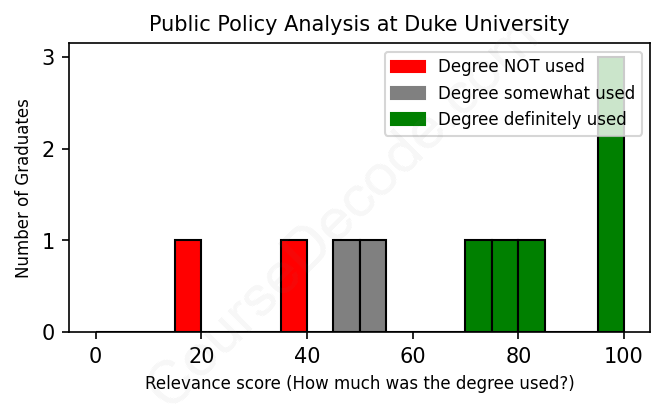
First, some facts. Of the Public Policy Analysis graduates from Duke University we've analyzed , here's how many have used (or NOT used) their degree in their career:

These are estimates based on AI analysis of 10 LinkedIn profiles (see below).
The verdict? On par with the average. Overall, with an average relevance score of 67%, Public Policy Analysis graduates from Duke University have about the same likelihood of finding work in this field as the average graduate across all fields:
And for comparison, here's the chart for all profiles we've looked at across all degrees.
Also, after graduating, 50% of these graduates have pursued further education other than another Bachelor's degree (such as a Masters degree or other), compared to the average across all profiles of 35%. This suggests you may need more than just a Bachelors degree to be competitive as a Public Policy Analysis graduate.
See the details:
|
Relevance score: 84% We think this person has gone into a career highly relevant to their degree. We think this person has gone into a career highly relevant to their degree.
DEGREE INFOGraduated in 2013 from Duke University with a Bachelor of Arts (BA) in Public Policy Analysis. No other secondary education since. JOB HISTORY SINCE GRADUATIONChase Leadership Development Program - Business Strategy & Analytics Analyst JPMorgan Chase Aug 2013 - Aug 2015 Planning & Analysis - Associate  J.P. Morgan Asset Management Sep 2015 - Oct 2017 Sr. Financial Analyst  Tory Burch Nov 2017 - Jul 2019 FP&A Manager  Tory Burch Aug 2019 - Jun 2020 Founder  Little Monograms LLC Sep 2021 - Present ABOUTNo information provided. |
The top 10 most common jobs done by the graduates we've analyzed (ranked most common to least) are:
When looking at the career paths of Duke University graduates in Public Policy Analysis, it’s clear that many have landed in roles that aren’t directly tied to traditional public policy work. A significant number have ventured into fields like finance and marketing, with positions such as financial analysts, marketing managers, and roles centered around business strategy. For instance, while financial analysts and managers at companies like Tory Burch and JPMorgan Chase leverage some analytical skills that might be similar to public policy analysis, their daily tasks often center more around financial metrics than policy-making or analytical assessment of social issues. This pattern suggests that while their education in public policy analysis gives them some valuable skills, many are applying those skills in non-policy-centric industries.
However, there are also individuals who have taken a more direct route into public policy or advocacy-related roles. Positions such as Organizing & Advocacy Fellow or roles at organizations focusing on community development and policy planning are strong examples where graduates are indeed utilizing their public policy knowledge and skills. Similarly, jobs in digital advocacy and journalism related to public policy show a more aligned path to their studies. In summary, while many Duke graduates with a degree in Public Policy Analysis have ventured into diverse fields, a solid number have pursued relevant roles that utilize the core competencies their education provided, especially in public advocacy and community planning. It reflects a mixed bag of outcomes, showcasing both the versatility of the degree and the varying levels of direct application in specific jobs.
Here is a visual representation of the most common words in job titles for Public Policy Analysis graduates (this is across all Public Policy Analysis graduates we've analyzed, not just those who went to Duke University):

Graduates from Duke University's Public Policy Analysis program seem to follow a pretty dynamic career path. For many, their first jobs right after graduation tend to be roles that are somewhat aligned with their studies, like analysts in finance or marketing positions that emphasize strategy. These initial roles often serve as stepping stones into more advanced positions within finance, non-profits, or governmental agencies. For instance, graduates have moved into significant roles at large organizations like JPMorgan Chase or the New York Times, which shows that many are able to leverage their education into impactful careers in various sectors.
Five to ten years post-graduation, these Duke alumni generally hold more senior roles, with many advancing to managerial or leadership positions, such as FP&A Manager or Marketing Director. A few have even branched out to start their own ventures, indicating a level of entrepreneurial spirit among them. On a positive note, while there are some that seem to have taken paths that diverge from traditional public policy roles (like becoming a Speech-Language Pathologist or staying at home), the majority appear to be engaged in careers that utilize their public policy analysis skills. Overall, the trajectory seems promising for these graduates, as they tend to find relevant and fulfilling roles that align with their degrees, often progressing into impactful careers over time.
Alright, so if you're thinking about a Bachelor’s in Public Policy Analysis at Duke, it’s definitely going to challenge you, but it's not unmanageable if you're ready to put in the work. Generally, these programs dive deep into economics, statistics, and political science, which can get pretty intense. Duke, in particular, is known for its rigorous academics, so expect a lot of reading, essays, and some tough projects. While it’s not the easiest degree out there, if you're passionate about the subject and can stay organized and motivated, it can be really rewarding. Just be prepared to juggle your time and tackle some tricky concepts—it’s not a walk in the park, but lots of students find it doable and even enjoyable!
Most commonly, in the LinkedIn profiles we've looked at, it takes people 4 years to finish a Bachelor degree in Public Policy Analysis.
Looking at the job trajectories of these Duke Public Policy Analysis grads, it seems like they’re mostly doing pretty well for themselves financially. Many of them have landed roles at big companies like JPMorgan Chase and Tory Burch, where salaries tend to be decent. Even those who started in public service or teaching seem to be moving into better-paying positions over time. A couple have become founders or have taken on leadership roles, which usually means good money follows. Of course, the stay-at-home mom in the mix might not be raking it in right now, but overall, most of these grads are likely earning a solid income, especially as they continue to level up in their careers. So yeah, it looks like they’re doing alright!
Here is a visual representation of the most common words seen in the "about" section of LinkedIn profiles who have a Bachelor degree in Public Policy Analysis (this is across all Public Policy Analysis graduates we've analyzed, not just those who went to Duke University). This may or may not be useful:

Here are all colleges offering a Bachelor degree in Public Policy Analysis (ordered by the average relevance score of their Public Policy Analysis graduates, best to worst) where we have analyzed at least 10 of their graduates:
| College | Score | Count |
|---|---|---|
 Duke University Duke University
|
67 | 10 |